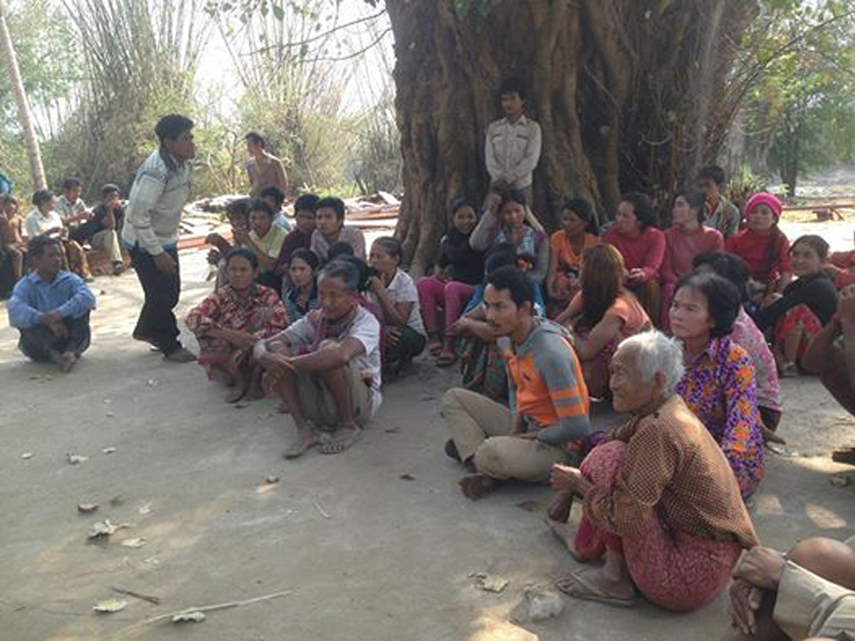-
Comment March 23, 2016
-
Go forward with courage
Comment March 23, 2016 -
Mother elephants protects calf from tourists
Comment March 22, 2016 -
-
The mind is the root
Comment March 19, 2016The mind is the root from which all things grow if you can understand the mind, everything else is included. It’s like the root of a tree. All a tree’s fruit and flowers, branches and leaves depend on its root. If you nourish its root, a tree multiplies. If you cut its root, it dies. Those who understand the mind reach enlightenment with minimal effort. ~Bodhidharma
-
The Story of the Question Raised by the Venerable Ananda
Comment March 19, 2016Verse 54: The scent of flowers cannot go against the wind; nor the scent of sandalwood, nor of rhododendron (tagara), nor of jasmin (mallika)2; only the reputation of good people can go against the wind. The reputation of the virtuous ones (sappurisa) is wafted abroad in all directions.
Verse 55: There are the scents of sandalwood, rhododendron, lotus and jasmin (vassika)3; but the scent of virtue surpasses all scents.
1. sappuriso/sappurisa: good and pious people; virtuous persons. The virtuous are the Noble Ones (the ariyas) and the virtuous worldlings (kalyana puthujjana).
2. mallika: Arabian jasmin.
3. vassika: Spanish jasmin.
The Story of the Question Raised by the Venerable Ananda
While residing at the Jetavana monastery, the Buddha uttered Verses (54) and (55) of this book, with reference to a question raised by the Venerable Ananda.
While the Venerable Ananda was sitting by himself one evening, the problem relating to scents and perfumes came to his mind and he pondered: “The scent of wood, the scent of flowers, and the scent of roots all spread with the current of wind but not against it. Is there no scent which would spread with the current of wind as well as against it? Is there no scent which would pervade every part of the world?” Without answering the question himself, the Venerable Ananda approached the Buddha and solicited an answer from him. The Buddha said, “Ananda, supposing, there is one who takes refuge in the Three Gems (the Buddha, the Dhamma, the Samgha), who observes the five moral precepts, who is generous and not avaricious; such a man is truly virtuous and truly worthy of praise. The reputation of that virtuous one would spread far and wide, and bhikkhus, brahmins and laymen all alike would speak in praise of him, wherever he lives.”
Then the Buddha spoke in verse as follows:
Verse 54: The scent of flowers cannot go against the wind; nor the scent of sandalwood, nor of rhododendron (tagara), nor of jasmin (mallika); only the reputation of good people can go against the wind. The reputation of the virtuous ones (sappurisa) is wafted abroad in all directions.
Verse 55: There are the scents of sandalwood, rhododendron, lotus and jasmin (vassika); but the scent of virtue surpasses all scents.
Dhammapada Verses 54 and 55
Anandattherapanha VatthuNa pupphagandho pativatameti
na candanam tagara mallika va
satanca gandho pativatameti
sabba disa sappuriso1pavayati.Cadanam tagaram vapi
uppalam atha vassiki
etesam gandhajatanam
silagandho anuttaro.Source: Tipitaka
-
How restless your mind is
Comment March 19, 2016If you just sit and observe, you will see how restless your mind is. If you try to calm it, it only makes it worse, but over time it does calm, and when it does, there’s room to hear more subtle things – that’s when your intuition starts to blossom and you start to see things more clearly and be in the present more. Your mind just slows down, and you see a tremendous expanse in the moment. You see so much more than you could see before. It’s a discipline; you have to practice it. ~Walter Isaacson, Steve Jobs
-
The Story of Visakha
1 March 18, 2016Verse 53: As from a collection of flowers many a garland can be made by an expert florist, so also, much good can be done (with wealth, out of faith and generosity) by one subject to birth and death.
1. kattabbam kusalam bahum: much good may be done. According to the Commentary, it means many deeds of merit should be done with wealth, out of faith and generosity.
While residing at the Pubbarama monastery in Savatthi, the Buddha uttered Verse (53) of this book, with reference to Visakha, the famous donor of the Pubbarama monastery.
When Visakha was seven years old, the Buddha came on a tour to Bhaddiya. On that occasion, the rich man Mendaka took Visakha and her five hundred companions with him to pay homage to the Buddha. After hearing the discourse given by the Buddha, Visakha, her grandfather and all her five hundred companions attained Sotapatti Fruition.
When Visakha came of age, she married Punnavadahana, son of Migara, a fairly rich man from Savatthi. One day, while Migara was having his meal, a bhikkhu stopped for alms at his house; but Migara completely ignored the bhikkhu. Visakha, seeing this, said to the bhikkhu, “I am sorry, your reverence, my father-in-law only eats leftovers.” On hearing this, Migara flew into a rage and told her to leave his house. But Visakha said she was not going away, and that she would send for the eight elderly rich men who were sent by her father to accompany her and to advise her. It was for them to decide whether she was guilty or not. When the elders came, Migara said to them, “While I was having my rice-with-milk in a golden bowl, Visakha said that I was taking only dirt and filth. For this offence, I’m sending her away.” Thereupon, Visakha explained as follows: “When I saw my father-in-law completely ignoring the bhikkhu standing for alms-food, I thought to myself that my father-in-law was not doing any meritorious deed in this existence. he was only eating the fruits of his past good deeds. So, I said, ‘My father-in-law only eats leftovers.’ Now Sirs, what do you think, am I guilty?” The elders decided that Visakha was not guilty. Visakha then said that she was one who had absolute and unshakable faith in the Teaching of the Buddha and so could not stay where the bhikkhus were not welcome; and also, that if she was not given permission to invite the bhikkhus to the house to offer alms-food and make other offerings, she would leave the house. So permission was granted to her to invite the Buddha and his bhikkhus to the house.
The next day, the Buddha and his disciples were invited to the house of Visakha. When alms-food was about to be offered, she sent word to her father-in-law to join her in offering food; but he did not come. When the meal was over, again she sent a message, this time requesting her father-in-law to join her in hearing the discourse that would soon be given by the Buddha. Her father-in-law felt that he should not refuse for a second time. But his ascetic teachers, the Niganthas, would not let him go; however, they conceded that he could listen from behind a curtain. After hearing the Buddha’s discourse Migara attained Sotapatti Fruition. He felt very thankful to the Buddha and also to his daughter-in-law. Being so thankful, he declared that henceforth Visakha would be like a mother to him, and Visakha came to be known as Migaramata.
Visakha gave birth to ten sons and ten daughters, and ten sons and ten daughters each were born to everyone of her children and grand-children. Visakha possessed an immensely valuable gem-encrusted cloak given by her father as a wedding present. One day, Visakha went to the Jetavana monastery with her entourage. On arrival at the monastery, she found that her bejeweled cloak was too heavy. So, she took it off, wrapped it up in her shawl, and gave it to the maid to hold it and take care of it. The maid absentmindedly left it at the monastery. It was the custom for the Venerable Ananda to look after the things left by any one of the lay disciples. Visakha sent the maid back to the monastery saying, “Go and look for the bejeweled cloak, but if the Venerable Ananda had already found it and kept it in a place do not bring it back; I donate the bejeweled cloak to the Venerable Ananda.” But the Venerable Ananda did not accept her donation. So Visakha decided to sell the bejeweled cloak and donate the sale proceeds. But there was no one who could afford to buy that bejeweled cloak. So Visakha bought it back for nine crores and one lakh. With this money, she built a monastery on the eastern side of the city; this monastery came to be known as Pubbarama.
After the libation ceremony she called all her family to her and on that night she told them that all her wishes had been fulfilled and that she had nothing more to desire. Then reciting five verses of exultation she went round and round the monastery. Some bhikkhus hearing her, thought she was singing and reported to the Buddha that Visakha was not like before, and that she was going round and round the monastery, singing. “Could it be that she had gone off her head?” they asked the Buddha. To this question, the Buddha replied, “Today, Visakha had all her wishes of the past and present existences fulfilled and on account of that sense of achievement, she was feeling elated and contented; Visakha was just reciting some verses of exultation; she certainly had not gone off her head. Visakha, throughout her previous existences, had always been a generous donor and an ardent promoter of the Doctrine of successive Buddhas. She was most strongly inclined to do good deeds and had done much good in her previous existences, just as an expert florist makes many garlands from a collection of flowers.”
Then the Buddha spoke in verse as follows:
Verse 53: As from a collection of flowers many a garland can be made by an expert florist, so also, much good can be done (with wealth, out of faith and generosity) by one subject to birth and death.
Dhammapada Verse 53
Visakha VatthuYathapi puppharasimha
kayira malagune bahu
evam jatena maccena
kattabbam kusalam bahumSource: Tipitaka
-
Empty Cognizance
Comment March 18, 2016~Tulku Urgyen Rinpoche
Try to imagine what it’s like when this moment of empty cognizance suffused with awareness starts to last for a full hour, unbroken. The very first moment of empty cognizance already has the potential for full omniscience, as well as the potential for compassion and loving kindness – the potential ability to protect and help other beings, as well as to manifest the activity that functions for the welfare of all. All these qualities are present, but not fully manifest. The longer this duration lasts, the more the qualities become visible, actualized. They don’t just appear later on, when realization is fully experienced. When the sun rises in the morning, do we have to wait for it to shine for it to be warm and brilliant? Although the noon sun may be stronger than the dawn sun, all of its qualities are present from the very first moment, though they may not be fully manifested. It’s the same in this training. What is essential is to train in order to attain stability.
Please understand that ‘rangjung yeshe’, self-existing wakefulness, is primordially endowed with all perfect qualities. The qualities of enlightenment are not a fabrication or a product. They are not a new achievement, an unprecedented new discovery, or something that we achieve. They are present from the very beginning. It’s like the unchanging brilliance of the sun shining in the sky. It can be obscured by clouds, but these clouds are neither primordial nor intrinsic to the sky; they are always temporary, momentary. What prevents full realization of our innate nature of self-existing wakefulness is the momentary occurrence of thoughts and fixation. Because this occurrence is momentary, it can be cleared away. It’s very important to understand this.
-
The Holy One
Comment March 18, 2016Cut off the stream energetically, holy one;
leave desires behind.
Knowing the destruction of all that is created,
you know the uncreated, holy one.
When the holy one has reached the other shore
in meditation and contemplation,
all bonds vanish for the one who knows.For the one I call holy
there is neither this shore nor that shore nor both,
who is free from fear and free from shackles.
The one I call holy is thoughtful, detached, settled,
accomplished, desireless, and has attained the highest goal.The sun shines by day; the moon lights up the night;
the warriors shine in their armor;
the holy one shines in meditation;
but the awakened shines radiantly all day and night.Because a person has put aside wrong, one is called holy.
Because one lives serenely, one is called an ascetic.
Because one gets rid of impurities, one is called a pilgrim.No one should hurt a holy one,
but no holy one should strike back.
Woe to the one who hurts a holy one;
more woe to the one who strikes back.It is no small gain to a holy one
if one holds one’s mind back from the pleasures of life.
The sooner the wish to injure disappears,
the sooner all suffering will stop.
The one I call holy does not hurt by body, speech, or mind,
and is controlled in these three things. Continue reading
















